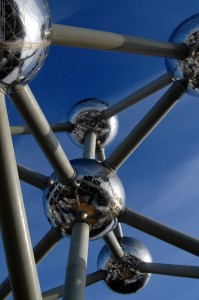Towards a Federal Europe
 When asked for my national identity on the 2011 Census form, I put European. Why? Because I am not proud to be a member of this state, specifically, but I am very proud to be a citizen of Europe.
When asked for my national identity on the 2011 Census form, I put European. Why? Because I am not proud to be a member of this state, specifically, but I am very proud to be a citizen of Europe.
Europe, historically, has been at the forefront of technological and social evolution. Many of the world’s most important discoveries and inventions originated here, and many of our member states had huge empires to their name in the days when that was the done thing. But most importantly to me, we champion civil liberties before anywhere else. The abolition of the death penalty throughout the Council of Europe (of which the EU is a subset) and the advancement of LGBT rights are the two that come to mind immediately.
If the EU is treated as a single federal nation, it will become the richest in the world (32% of Earth’s GDP), while holding onto the third largest population (half a billion people, or 7% of Earth). In short, we’d be unstoppable.
The European Union already has a lot in common with federal nations like the United States, India and (recursively) Germany. We have a central parliament and high court which, like the United States, only has jurisdiction over certain aspects of the law. We have a single currency although many states have not yet adopted it. And we have some forms of common home policymaking (the European Commission) and foreign policy (CSDP and Eurofor).
So what’s missing? Why isn’t Europe considered a nation right now? Primarily this is because the individual states refuse to give up their sovereignty — something which will be very hard to pry away from many of them (especially the UK) with their long-standing traditions of empire-building and patriotism. Also required would be some form of written or unwritten constitution (which is an ongoing battle) and a single taxation system contributing to a federal exchequer. I don’t think these two are completely unrealistic long-term goals.
As a reader you can probably think of several disadvantages and I’d like to share my opinions on several of those:
Culture and Language
We’re all from different cultures and speak different languages, say the patriots. Well, that’s true, but is that such an oddity in a large nation? In India, there are hundreds of languages, of which 29 have more than a million native speakers each! Some states in Europe such as Belgium and Malta already cope just fine with multiple languages being spoken natively. And, closer to home, you’d hardly expect too many similarities between the culture of Burnley and the culture of Brighton. Culturally speaking, on a global scale most European states are pretty aligned.
Holes in the land
Norway, Switzerland and the microstates have elected to stay out of the Union, leaving holes in the land. This is not unheard of either: San Marino and the Vatican are already enclosed by Italy. Lesotho is surrounded by South Africa. And if tribal sovereignty is not ignored, the United States is full of holes!
We’ve got a Queen
Well that is an interesting one. Several of the states of Europe do indeed have their own monarchs. In a federation this too is not unprecedented. The United Arab Emirates is a federation of seven states, each with its own monarch. There is no reason to sacrifice a monarchy for the sake of federation.
Foreign policy
Should we let the European bigwigs decide what we do or don’t do with regard to other nations? Two words: Tony. Blair. Enough said?
The Euro has failed
A single nation would need a single currency, and the Euro has not done so well in recent times, thanks to the market crashes in Greece and Ireland. But I say we would all be helping each other out in these situations regardless, because that’s what allies do. Why not make it official and give us no choice but to support the poorer states with money from the rich? After all, it might be our turn in 50 years’ time.
Europe is a continent
Actually, Europe is described as a continent purely because of our cultural heritage, so this is a sign that we should be better united. There is no geological basis for the European continent at all. Oh, and by the way, Australia and India each make up the bulk of their respective tectonic plates.
I think I’m very much a dreamer in this regard, and I don’t think we’ll see a truly United Europe in my lifetime, but I’m hoping the progress is towards a Federal Europe and not away from it.
Next stop: United Earth!


 Leeds-based non-binary nerd and sewist. I won't break my streak on Duolingo for anyone.
Leeds-based non-binary nerd and sewist. I won't break my streak on Duolingo for anyone.  Delicious
Delicious Leeds Beer Quest
Leeds Beer Quest Twitter
Twitter